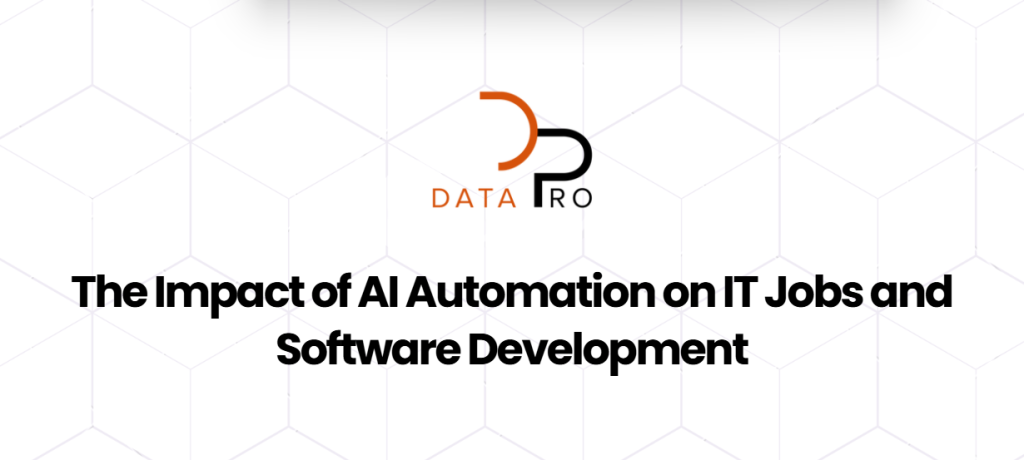
The Impact of AI Automation on IT Jobs and Software Development
We’re standing on the edge of a transformation. AI is no longer a concept of tomorrow, it’s deeply embedded in the technology landscape today. From code generation to infrastructure management, artificial intelligence is automating critical aspects of software development and reshaping the roles of IT professionals.
While automation has long been a part of the tech ecosystem, the rise of generative AI and machine learning is accelerating changes across the board. And although this creates new opportunities, it also raises concerns. Will AI take over software development? Or will it simply change the way we work?
The answers aren’t black and white. But one thing is clear: AI is already altering workflows, shifting required skillsets, and redefining value in the software industry.
Let’s explore where we are now, what’s changing, and what experts think lies ahead.
Anxiety in the Developer Community
Recent reports from institutions like PwC and Deloitte suggest that a significant portion of IT jobs, especially those tied to manual coding and infrastructure monitoring could be automated within the next 10 to 15 years.
According to a 2024 survey by Stack Overflow, 34% of developers worry that AI might make their jobs redundant, especially in areas like front-end development and quality assurance. And yet, 68% also report already using AI tools daily to streamline their tasks and boost productivity.
So, there’s an interesting contradiction: while some fear AI, most are embracing it as a powerful ally.
Where We Are Now: AI’s Role in Software Development
AI is no longer theoretical in tech teams, it’s operational. It’s influencing the way code is written, tested, deployed, and maintained. Here’s a breakdown of where we see AI’s presence today:
Code Generation and Autocompletion
AI-powered tools like GitHub Copilot, Amazon CodeWhisperer, and Tabnine help developers write code faster by suggesting lines, functions, or even entire modules based on context.
While these tools aren’t perfect, they reduce boilerplate work and free developers to focus on architectural decisions, logic, and performance optimization.
“AI won’t write perfect code, but it’ll get you 80% of the way. That last 20%? That’s still a human’s job.”
— Sundar Pichai, CEO of Google
Bug Detection and Testing
Machine learning-based testing frameworks can now detect anomalies and vulnerabilities much faster than traditional testing methods. Tools like DeepCode, Testim, and Snyk help with early bug detection, security scanning, and predictive test case generation.
DevOps and Infrastructure Automation
AI is optimizing CI/CD pipelines by predicting deployment failures, managing incident responses, and automating performance monitoring. Systems like Datadog, Splunk, and New Relic AI Ops are rapidly becoming industry standards.
“The shift is already happening. DevOps engineers now spend more time reviewing automation rules than writing shell scripts.”
— Nicole Forsgren, PhD, Co-founder of DORA
AI Tools Reshaping the Industry
GitHub Copilot
Copilot uses OpenAI’s Codex model to suggest code based on natural language prompts and coding context. It’s embedded directly in editors like VSCode, enabling real-time support for developers.
Pros:
- Speeds up development
- Reduces syntax and logic errors
- Helpful for junior devs learning new frameworks
Cons:
- Occasionally suggests inaccurate or outdated code
- Can encourage over-reliance
- Raises questions around IP and licensing
Kite and Tabnine
These tools offer AI-powered autocompletion with language-specific intelligence. While not as powerful as Copilot, they are lightweight and language-agnostic, supporting a wide developer base.
CodiumAI and CodeGuru
Tools like CodiumAI assist with writing test cases, while Amazon CodeGuru helps review code and suggest optimizations, especially for performance-critical applications.
AI in Cloud Platforms
AWS, Google Cloud, and Azure all offer AI-based development tools from infrastructure provisioning using natural language prompts to AI-generated architecture recommendations. These are powerful, especially for enterprise-scale projects.
The Shift in Skills: What Developers Need Now
AI won’t eliminate developers, it will evolve them. Future developers will need more than just coding skills.
Machine Learning Fundamentals
Even non-ML engineers will benefit from understanding basic machine learning concepts. This includes knowing how models are trained, how to interpret predictions, and how to work with AI APIs.
Prompt Engineering
With tools like Copilot and GPT-powered assistants, knowing how to write clear, detailed prompts becomes a superpower.
Data Fluency
Understanding how to clean, manipulate, and analyze data is now a key skill across most tech roles. Python, SQL, and tools like Pandas, NumPy, and Spark are becoming standard requirements even outside data science.
Understanding AI Limitations
Knowing when and how to use AI is just as important as knowing how it works. Developers must understand model biases, ethical considerations, and failure points.
Business Context
As automation handles more of the technical execution, developers who understand business logic, customer needs, and product goals will stand out.
“In the future, the most successful developers will be those who understand business impact, not just code syntax.”
— Martin Fowler, Software Development Thought Leader
Case Study: GitLab’s AI Integration
GitLab recently integrated AI-powered code suggestions, vulnerability detection, and CI/CD optimization tools into its platform. The results?
- 23% reduction in time-to-release
- 17% fewer bugs caught in QA (because they were caught earlier)
- 30% faster incident resolution
This shows how AI isn’t replacing developers but helping them move faster and smarter.
Bridging the Talent Gap
While some roles will be absorbed by AI, up to 80% of tech roles will remain human-centric, according to a 2025 report from McKinsey.
The demand for AI-fluent software engineers, MLOps specialists, and data engineers is skyrocketing. Job boards like Indeed and LinkedIn show that AI-related job postings have more than tripled in the past 3 years.
To remain competitive, tech professionals must commit to lifelong learning. Online platforms like Coursera, Udemy, and edX now offer specialized AI programs tailored for software engineers.
Soft Skills Will Matter More Than Ever
While technical upskilling is important, soft skills are becoming equally essential:
- Adaptability: The pace of change is relentless. Being comfortable with change is now part of the job description.
- Critical Thinking: Can you spot flawed logic in an AI recommendation? That’s a human skill.
- Collaboration: Cross-functional teams need strong communicators who can align AI capabilities with real-world needs.
- Creativity: AI can’t innovate. It can remix and suggest but not invent. Creative thinkers will drive product breakthroughs.
The Verdict: Will AI Replace Developers?
Not anytime soon.
While AI will absorb repetitive tasks, it lacks judgment, context-awareness, and the creative nuance that complex software demands. Programmers are more than just code writers, they’re problem solvers, system architects, and user advocates.
“AI will not replace developers. Developers who use AI will replace those who don’t.”
— Andrej Karpathy, Former Director of AI at Tesla
Looking Ahead
We’re heading toward a future where AI is the new baseline, not a novelty. Development teams that embrace this shift, retrain their skills, and integrate intelligent tools will thrive.
The key is not to compete with AI but to collaborate with it.
So will software development jobs disappear? No. But they will transform, and those who adapt will lead the next generation of innovation.
Innovate With Custom AI Solution
- 12 Courtyard Pl,
Lexington, MA 02420 - (617)319-0174
- corp@dataprocorp.tech
